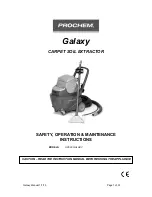
GB - 23
▷
Place the upper section on the container and close the side
latches.
(* depending on the equipment variant)
8
Changing the filter
8.1
Changing the folding filter
(See short-form instructions
)
▷
Shake the folding filter cassettes before changing them.
▷
Turn the lock on the latch through 90° in a counter-clockwise
direction with a coin or similar object and push the latch to the
rear.
▷
Fold the hood up
▷
Immediately isolate the folding filter cassettes that you have
removed in a dust-tight plastic bag and dispose of properly in
accordance with the stipulations.
▷
Insert new folding filter cassettes.
▷
Lift the locking bracket up, fold the hood down and click in place
with light pressure.
9
Changing the motor protection filter
(See short-form instructions
)
NOTE
If the motor protection filter is contaminated this indicates defec
-
tive filter cassettes.
▷
Replacing the folding filter cassettes.
▷
Replace the motor protection filter or wash the motor
protection filter under flowing water, dry and re-insert..
10 Transport
▷
Insert the closing plug* of the vacuum cleaner into the suction
aperture.
▷
The motor head must be securely fixed to the container (close
the latches).
▷
Place the accessories in a suitable plastic bag and seal the plas-
tic bag or place it in the tool storage compartment.
▷
Plug the ends of the suction hose into each other.
▷
Place the hose around the vacuum cleaner and clamp onto the
handle
(see short-form instructions).
11 Maintenance
NOTE
Switch the vacuum cleaner off and pull out the mains plug before
any maintenance work.
For maintenance by the user, the vacuum cleaner must be
-
dismantled,
-
cleaned and
-
maintained,
as far as possible without creating any danger to the maintenance
personnel or other.
Precautionary measures
Suitable precautionary measures include
-
Cleaning before dismantling,
-
Provide local filtered positive ventilation where the vacuum
cleaner is to be dismantled,
-
Clean the maintenance area and
-
suitable personal protection equipment.
Precautionary measures with vacuum cleaners class H and M
The outside of the vacuum cleaner should be cleaned and wiped
down or should be treated with a sealing agent before being
removed from the dangerous area. All parts of the vacuum cleaner
must be considered to be contaminated when they are removed
from the danger area and suitable handling must be used to
prevent dust distribution.
Contaminated items
When carrying out maintenance or repair work, all contaminated
items which have not been adequately cleaned must be disposed
of. Such items must be disposed of in impermeable bags in ac-
cordance with the applicable regulations concerning the disposal
of such waste.
Technical testing
A technical examination must be carried out at least once a year
by a trained person: check the filter for damage, ensure that the
vacuum cleaner is air-tight and check that the monitoring equip-
ment functions correctly.
Testing the effectiveness of the vacuum cleaner
NOTE: In addition, the effectiveness of the vacuum cleaner class
H
must be checked at least once a year.
There must be an adequate air exchange rate L in the room if the
exhaust air returns to the room. Further information can be taken
from your national regulations.
If the suction of the vacuum cleaner reduces and the cleaning
procedure of the folding filter cassettes increases, the suction
performance is not adequate (provided that the container is empty
and the paper filter bag has been replaced) then it is necessary to
replace the folding filter cassettes
(see short-form instructions
and Section 8.1)
.
Summary of Contents for BWDVC Top Permanent
Page 179: ...RUS 179 1 l l H l 60 l He l ISPAR ISPARD 0 1 3 0 1 3 l...
Page 180: ...180 RUS l l 2 3 0 I IR AR...
Page 182: ...182 RUS l 6 7 1 3 7 1 7 2 IR 7 3 180...
Page 183: ...RUS 183 7 4 ISPARM ISPARH ISP ARH Asbest 180 8 8 1 90 9 10 11...
Page 184: ...184 RUS 12 AR I IR 3 AR 7 4 stellen 7 3 L 8 1 11 1 11 2 l...
Page 188: ...188 5 4 3 1 2 3 4 5 6 9 6 1 2 1 1 7 8 2 8 8 1 Typ ISP 1200 1600W Stand Issue 03 10...
















































